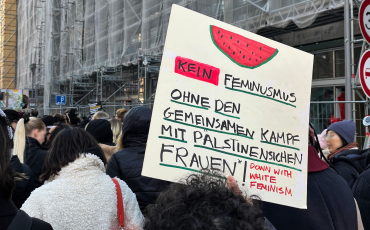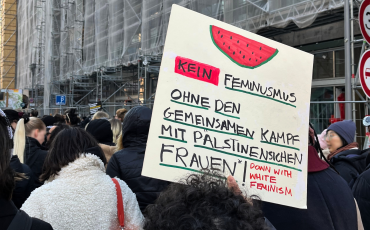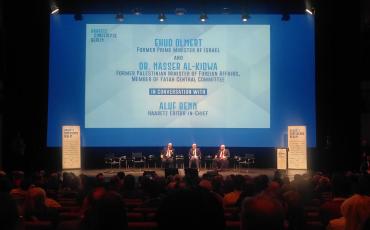How did October 7 th impact activists in Israel and Palestine? dis:orient talked to a Palestinian and an Israeli member of the binational organization Combatants for Peace about education, solidarity, and continuing work amidst the war in Gaza.
Combatants for Peace (CfP) is a binational grassroots organization founded in 2005 by former Israeli and Palestinian fighters, who have taken an active part in the cycle of violence. Its members engage in non-violent activism against the occupation, for freedom and equality for all the people in Palestine and Israel.
Eszter Koranyi lives in Jerusalem. She has been involved with CfP for over six years and coordinated the Israeli Freedom School. Recently she was appointed CfP’s Israeli Executive Co-Director.
Nimala Kharoufeh lives in Bethlehem three generations after the Palestinian Nakba of 1948. She has been politically active since her early age and got involved with different forms of nonviolent resistance. She joined CfP as an organizer of the Palestinian Freedom School.
Disclaimer: The interview was conducted prior to the ground invasion of Rafah by the Israeli military and therefore does not depict the events since then.
Eszter, Nimala, how did you personally experience October 7th?
Nimala: The day itself was a shock for me. I woke up from the sound of the sirens going off because rockets were fired from Gaza towards Jerusalem. As a Palestinian, the pictures showing the collapse of the apartheid wall felt somewhat like a victory to me at first. But I only saw one side of the news. When I heard the other stories in the afternoon, I was even more shocked. It was very important for me to check in on my Jewish Israeli friends living near the border and my Palestinian friends in Gaza. The airstrikes on Gaza began the night of the same day. I thought it would only last a few days, but now it has been months of ongoing collective punishment. People in Gaza are starving, aid is being blocked by the Israeli military and protesters, more than half of the housing units have been destroyed, and everybody lost someone–there is so much suffering.
Eszter: Like Nimala I woke up to sirens. I was with my family in Tel Aviv visiting friends for the Sukkot holidays, a week-long Jewish holiday. I was in shock–the whole Israeli society was in shock. For people who are more aware of the situation in Gaza and warning voices in Israel, something happening was probably not surprising. But the sheer brutality of Hamas’ attacks was just shocking. On the first day, to keep myself functioning, I decided to avoid looking at pictures or videos. I could not sleep. I remember worrying about how I could explain what happened to my children.
What was your reaction at CfP during those first weeks (after October 7th)?
Eszter: We started national and binational meetings soon after. It was important to keep our community up, but it was also very difficult and emotional. In one of our first meetings after October 7th, someone was denying the rapes, denying the killing of innocent people and the violence of Hamas on October 7th. When I reached out to a friend with family in Gaza, I wondered if she was even willing to talk to me, an Israeli, with everything her family is going through. There were many mixed feelings, many layers – for me personally and within the organization.
Nimala: In our community, there were a lot of uncertainties: should we talk? Do we even want to talk? But we started our meetings and we managed to see the perspective of the other. We Palestinian members know of all the terrible things that have happened in the Gaza envelope [the areas in Southern Israel close to the Gaza Strip, ed. note] because we had the chance to speak with Israelis.
When we are in pain we often do not see other realities. The airstrikes on Gaza started the night of the 7th of October. From that moment on, many Palestinians shut down. There was little time to digest or even develop empathy for what had happened in Israel in the morning. Over 700 Palestinians died that first night, now the death toll is at over 33,000 [April 2024, ed. note][1] and people are starving. The Israeli media keeps showing only one side, Netanyahu and other politicians from the coalition government are bashing Palestinians, calling them ’animals’.
What role do the media play here?
Eszter: At CfP, we are affected by the media disparity. Palestinians have different images and information about what happened on October 7th. This disparity is something we at CfP have to deal with. We are working hard to make sure we are on the same page in understanding the depths of terror. I am not sure if we are really making an impact...
Nimala: Yes, it is a continuous challenge. If you check out Israeli media, there is nothing on Gaza. Israeli influencers on Instagram say that all Gazans are terrorists, which of course they are not. More than 14,000 Children [April 2024, ed. note] were killed! The different narratives in the media lead to a huge gap between Palestinian society and Israeli society; everyone is showing the side they want to show. It is a swamp of hate and incitement on both sides.
Eszter: Well, Israeli media do mention Gaza. They have to explain why thousands of soldiers are deployed there, still fighting. Fathers from my children's kindergarten have been absent, fighting in there. It is a crazy reality if you think about it. Obviously, Gazans’ suffering cannot be compared to it. Still, for children in Israel to not see their fathers for months is a terrible thing. And it is very present in people’s everyday life. I have friends who say “khallas, the war has to stop” and I do know people who say “these people are terrorists, so it is okay for my husband to still be fighting in Gaza. Maybe he will die, but it is the only thing that saves Israel”. So there is news about Gaza, but – with few exceptions – you only see numbers, not the human suffering.
Can you tell us more about your work with young Israelis and Palestinians at CfP?
Nimala: Both, our Palestinian and our Israeli program are designed to create a safe space for youth, raise political awareness and provide them with opportunities to engage in nonviolent activities. At the Palestinian Freedom School we talk about topics not covered by regular curricula: their personal stories, the different narratives, the power dynamic as well as nonviolent resistance. During our 6-month program the participants are helping out farmers in Area C or meeting people affected by house demolitions carried out by the Israeli military. We also talk about the Nakba and the Holocaust – and how those experiences shape our respective societies until today. At the end of the program, they have the opportunity to meet participants from the Freedom School in Israel.
Eszter: The idea of the Israeli Freedom School is similar. Deconstructing the Israeli narrative, learning the Palestinian narrative and about the Nakba–and seeing what that means for our identities if we accept it – this is part of the program. So it basically means: relearning. Finding community, being around people that are interested and like-minded is fundamental, because many of them do not have this at home or with friends.
How is the current situation impacting your programs?
Nimala: Participants of the Palestinian program have only recently been able to meet in person again. With the ongoing settler violence and the Israeli military presence on the roads, it is still not safe for many of them to come to Bethlehem, where our office is based. Mobility is a constant issue for young Palestinians. Some participants are in their 20s and have never been able to visit Jerusalem, which is only an hour away. That is the injustice of the occupation.
Eszter: We had to cancel one of our Israeli cohorts this year and had new participants only recently, but it was important to keep the safe space we created for our alumni to talk. A lot of them were in shock, university classes stopped, and many feared they might lose their jobs. Many were closed off at home and politically isolated. They still try to support wherever they can: for example through protective presence in the West Bank and trying to counter all the settler violence. And through organizing lectures for a younger Israeli audience on Gaza and perspectives absent in the main discourse, in which hundreds participated.
There is a danger of romanticizing "dialogue", especially in European discourses regarding Palestine-Israel. What is your opinion on this and how is meeting the other side even possible given the reality on the ground?
Nimala: Military options are not a solution at all. We need another way. Learning and understanding the other narrative is part of that. Since the Oslo agreement, I have been involved in a lot of the coexist-programs. Most of them avoided analyzing the roots of the conflict in depth. We did not talk about the Nakba or the Holocaust, nor the fear, the nationalism, or how politics relate to religion. We talked about peace, “yallah, let's have hummus and falafel”, but there are occupied and occupiers. Many had the vision to have peace, but they did not take the political reality into account.
Eszter: Having experienced classic dialog groups, we saw that if you meet the other side without any preparation, it can be very shallow and the first reflex of many people is to go into self-defense. We start with national processes as we need to hold space for complexity and reflect with people who grew up with the same narratives before meeting the others. We on the Israeli side, have to be ready to let go of some of the territory and some of our expectations, to have land for everyone.
Nimala: At CfP we Palestinians call the Israeli members our partners even though they do not suffer from the occupation the same way we do. We all share the belief and the commitment that we must end the occupation, which became even clearer with October 7th. We are not working with people in (army) uniform or who have gone back to the army right away after October 7th. Those people are not welcome anymore because despite taking part in our program and meeting Palestinians, they went back fighting. Our participants understand that no side is going to leave this land and that we need to find a way to live together. Acknowledging and taking active responsibility is one of the values that we work on at the Freedom School. So despite accusations of being an organization that normalizes the occupation, we had over 50 applications for our new Palestinian cohort in April and now over 25 people participating. Young Palestinians love life and want to find hope in this land.
What does solidarity mean to you?
Nimala: In my opinion, solidarity means supporting the right thing to happen on this land: supporting justice and the right for the people to exist, supporting the values of non-violence and the self-determination right of Palestinians within the borders of 1967[2]. It also means not supporting the military operation in Gaza. What we do here, is not easy: being open-minded, talking to the other side, and having a shared vision for the future. This is what I want people to support: People, who really have a good intention, a good vision for this land. Who believe in peace –not only through words but through real actions, yani, as a principle in their life.
How does this approach apply to international politics?
Nimala: Ending the occupation is the only durable solution. This is the role and position that Europeans should take on. Not just by writing a report, real measures would mean implementing sanctions or taking Israel to court as South Africa did beginning of the year. Israel is not respecting the 1967 borders . It has been over 50 years since then and we only see more illegal settlements and more isolated communities in the West Bank. This is also the responsibility of the international community–they failed.
Eszter: I agree, we do need the help of the international community. Giving the legitimacy to Israel to commit war crimes is not the way. The US, Germany and others should stop financing the Israeli army–or at least cut the funds–so that we invest in guarding the internationally agreed borders and not finance oppressing civilians in the Occupied Territories. I do not have high expectations regarding the EU, but strengthening the economic cooperation with Palestine, strengthening their civil forces, and investing in peace education would help as well.
Despite all of this, you are keeping up with the work…
Nimala: I have no other choice. I still see a possibility to live in peace on this land and that is what gives me hope and power to continue my work. My ancestors belong to this land, my family is here. This is my homeland; I love it and I want to see it doing well.
Eszter: I second that. The last few months have made me all the more determined, that this has to stop and that we both deserve to live in peace. I believe the world can become a better place. It depends on each individual and not only on high politics. I got this way of acting and thinking from my two grandmothers. After surviving the Holocaust, they have managed to build themselves, their families, and their careers up. If they were able to do this, who am I to give up?
[1] The UN has so far not been able to produce comprehensive figures themselves. This figure from the UN update was provided by the Ministry of Health and the Government Media Office in Gaza.
[2] 1967 borders is a common term for the demarcation line before the war of 1967. Those borders have been widely recognized internationally and referred to in international documents.





















